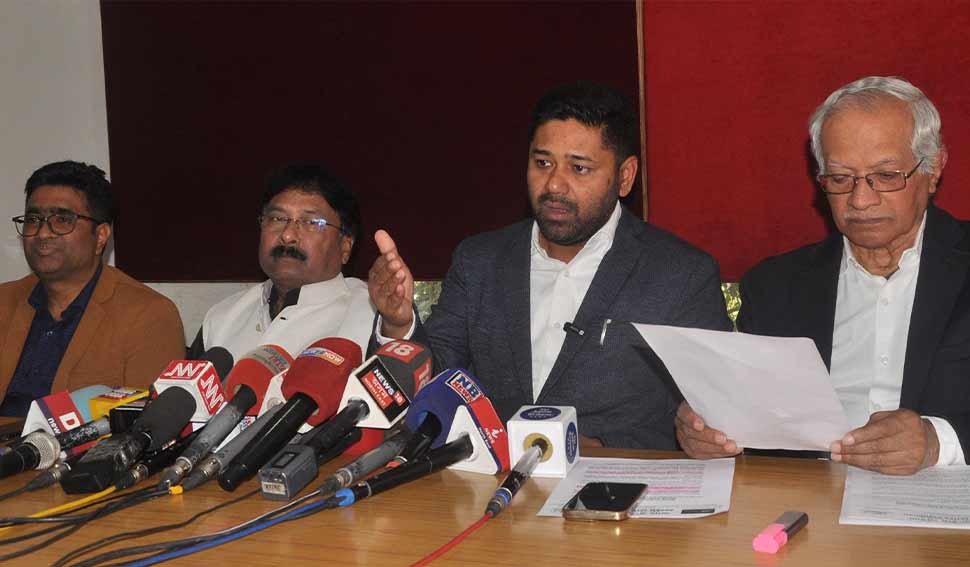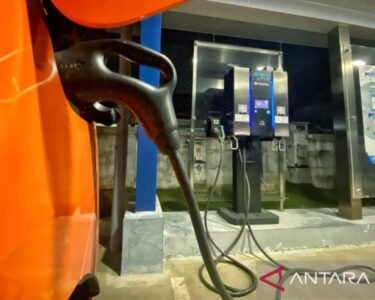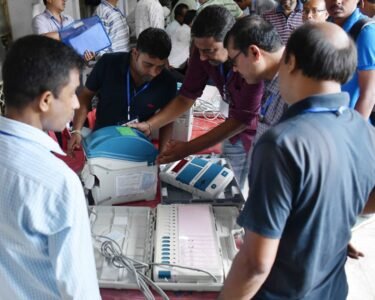
Assam Jatiya Parishad (AJP) on Wednesday called for transparency in the election process for the upcoming Lok Sabha elections in the aftermath of the notice of the Supreme Court of India for counting of all Voter Verified Paper Audit Trail (VVPAT) paper slips in elections, instead of verification of only 5 randomly selected Electronic Voting Machines (EVMs) in each assembly segment of a parliamentary constituency.
A division bench of the apex court comprising Justices BR Gavai and Sandeep Mehta passed the order, tagging a writ petition filed by the Association of Democratic Reforms (ADR) seeking verification of each vote cast in the EVM with the VVPAT slips.
The petition challenged the ECI guidelines that mandate verification of VVPAT one after the other. The petition said that such a process causes undue delay and suggested that the poll panel should instead deploy more staff and do simultaneous verification of the slips.
Addressing a press conference in Dibrugarh on Wednesday, AJP secretary and spokesperson Ziaur Rahman said: “We feel that there is a need to form public opinion on the issue.” Rahman emphasized the importance of addressing the concerns raised about EVMs, especially considering their widespread use since the 2004 elections.
Various political parties, including the ruling Bharatiya Janata Party (BJP), have previously questioned the reliability of EVMs. Notably, figures such as former BJP national president Rajnath Singh and former Deputy Prime Minister LK Advani openly expressed doubts about EVMs after the 2009 Lok Sabha elections.
Advani, in a statement outside Parliament in 2009, highlighted concerns about the absence of VVPATs despite a Supreme Court order.
The AJP drew attention to a Public Interest Litigation (PIL) filed by the Association for Democratic Reform (ADR) in the Supreme Court on May 16, 2021. This PIL raised crucial points for enhancing the transparency of the electoral process, including the need to count all VVPAT slips and ensure adequate lighting at polling stations.
In response to the Supreme Court’s notice, the party welcomed the move, considering it a step towards addressing the doubts surrounding EVMs.
In a press release issued by AJP general secretary Jagdish Bhuyan and Vice President Chandrakant Das reiterated the party’s demand for immediate implementation of measures to enhance transparency, starting from the first phase of the upcoming Lok Sabha elections.
As the debate on EVM reliability continues, the regional party remains committed to advocating for a more transparent and accountable electoral process in India.
“EVMs were first used experimentally in India in the 1982 elections. However, since the 2004 elections, the use of EVM has been finally introduced in the country from 2004 Lok Sabha elections,” Bhuyan and Das said.
“The trustability and reliability of EVMs have been questioned at different levels by various political leaders. Even then BJP president and now Defence minister Rajnath Singh and then deputy premier Lal Krishna Advani also expressed doubt on the trustability of EVMs after the debacle in 2009 elections,” they said.
“Given that many questions are being raised by experts about VVPATs and EVMs and the fact that a large number of discrepancies between EVM and VVPAT vote count have been reported in the past, it is imperative that all VVPAT slips are counted and a voter is allowed to properly verify that his vote as cast in the ballot is also counted by allowing him to physically drop his/her VVPAT slip in the ballot box”, they further said.
First introduced in India in the 2014 Lok Sabha elections, the VVPAT is a ballot-less system connected with the EVM which prints a paper slip when a voter casts his/her vote on the EVM against the candidate’s name and the symbol of the party he/she is standing for.
As soon as the voter presses the button on the EVM, the VVPAT machine prints the slip that contains the name and symbol of the party they have voted for. The machine also has a transparent window where a voter can see the printed slip. After this, the slip goes inside a sealed box of the machine.
The top court, on April 8, 2019, ordered the ECI to increase the number of EVMs that undergo VVPAT physical verification from one to five per assembly segment in a parliamentary constituency.





